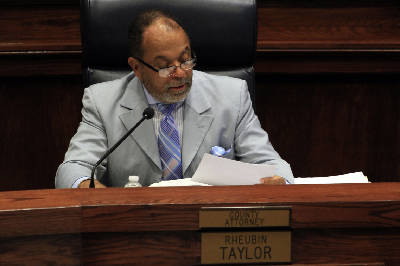Hamilton County’s destruction of public records should set off fire alarms

Hamilton County government has found a new way to prevent access to public records: get rid of them.
It’s not really new. It’s the oldest trick in the book.
In late July last year, a reporter with the Chattanooga Times Free Press became concerned that the county government was not following state law in its responses to public records requests.
So the reporter, Sarah Grace Taylor, requested to inspect all public records requests and responses to those requests for the previous 12 months from the Hamilton County Attorney’s Office.
Hamilton County Attorney Rheubin M. Taylor is listed as the “public records request coordinator” in the county’s public records policy, and Dana Beltramo, an attorney, is listed as the designee in his office responsible for managing requests.
The job of a public records request coordinator is specified in state statute: “[T]o ensure that public records requests are routed to the appropriate records custodian and that the requests are fulfilled in accordance with T.C.A § 10-7-503(a)(2)(B).”
Not many job titles and functions are outlined specifically in state law, but this one is. The part of the Tennessee State Code referenced in the job duties describes the written responses that a government entity must give in responding to a records requests and what must be contained in those responses.
County seeks to charge more than $717 for records
Though the newspaper was only requesting to see the public records requests and written responses for the parts of county government handled by the county attorney’s office, the county attorney’s office said the newspaper would have to pay $717 in advance to compile and print the records to make them available for inspection.
The newspaper balked. It only asked to inspect records, not get copies. And under the law, no charges could be levied for inspection. The newspaper had advisory opinions from the state Office of Open Records Counsel to back it up.
The county attorney’s office was unswayed by the newspaper’s protestations.
The news reporter followed up in an email on Sept. 18:
“I (wanted) to follow up on this request. In the month since we last talked, I’ve heard a rumor that you all were looking at changing your estimate for the inspection of the records and I wanted to follow that lead before we pursue these records through another method,” reporter Sarah Grace Taylor wrote.
County Attorney Rheubin Taylor responded the same day, also by email: “I don’t know from whom you received ‘a rumor’ about my office changing anything, but it certainly wasn’t from a reliable source. Nothing has changed.”
County attorney gets permission to destroy records
It was not long after Sept. 18 that a meeting of the Hamilton County Public Records Commission was called and set for Oct. 2. The county attorney’s office had requested to be on the agenda.
According to the draft minutes of the meeting:

“Dana Beltramo with the County Attorney’s Office, brought a resolution seeking the Commission’s permission to destroy public record requests and responses after 30 days. The County Attorney’s Office has researched the matter and can find no statute that states how long these have to be retained. Dana stated that 98% of the requests are in the form of emails. A motion to approve the resolution was made by Marc Gravitt and seconded by Bart McKinney. The vote to approve the resolution was unanimous.”
Gravitt is the county’s Register of Deeds, and McKinney is the director of county information technology. They are listed in the draft minutes as two of the four commission members present. County Commissioner Randy Fairbanks and County Clerk Bill Knowles were the other two.
Fairbanks has since told the Times Free Press that he did not know of the newspaper’s outstanding public records request to see the very records requested for destruction. The minutes do not reflect that Beltramo or Rheubin Taylor, who was listed as present as a guest, mentioned this to the commission.
No journalists were at the meeting. It is unclear whether proper adequate notice, as required by law, was given for the meeting.
Newspaper continues to ask for records
A few months pass, and newspaper executives began to get involved in the stymied request, including meeting with county officials to press their case. They were unaware then that the county attorney’s office had gotten permission to destroy the very records they had been requesting.
Then on Jan. 10, after meetings with county officials, the newspaper amended its request, clarifying that it did not want any requests or correspondence related to individual health records or EMS calls, and it did not want to view any of the actual requested materials. It only wanted to see the requests themselves and “all written responses provided by the attorney’s office to the requestors and any related correspondence between any operative of the attorney’s office and any requestor.”
The newspaper appeared to be acting in good faith, narrowing its request, perhaps to make it easier to fulfill.
January: The records are gone, says county attorney’s office
On Jan. 21, Beltramo responded and shared for the first time that, actually, the requests and written responses to the requests had been destroyed.
“Because there is no statute regarding retention of public records requests, the Hamilton County Public Records Commission met October 2, 2019, and determined that requests and related correspondence need only be retained for a period of 30 days Accordingly, I do not have any email correspondence for the period you’ve requested. However, I do have a few pieces of correspondence conducted via U.S. Mail, and I have provided copies of these.”
Beltramo goes on to say that she has a “log of requests and dispositions that dates back to February 25, 2019.” But the requests and the written replies that document the official functions of the office are apparently gone.
Beltramo didn’t set fire to the records, like the Memphis Police famously did back in 1976 when it doused 10 file cabinets of domestic surveillance records with fuel and lit them up.
But whatever happened, it seems to be some kind of inferno over there in Hamilton County.
Deborah Fisher is executive director of Tennessee Coalition for Open Government, which tracks access to public records and advocates for open government.



